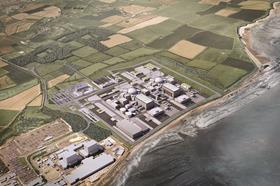Lawyers warn Austrian challenge to European Commission’s go-ahead for £16bn nuclear power project could lead to long delay

The £16bn Hinkley nuclear project could yet be caught in years of legal wrangling after the Austrian government said it would challenge Brussels’ historic decision this week to give the project the green light.
The European Commission (EC) gave the go-ahead to the Hinkley Point C nuclear power project this week, after ruling the deal the UK government struck with EDF, the developer of the project, does not breach European state aid rules.
The EC said the government’s plans to subsidise the construction of the £16bn power plant were compliant after “significant modifications” during the examination process, which it said would reduce the amount of taxpayer support given to the project.
The EC’s approval was the final regulatory hurdle for the project, which would be the first nuclear power station to be built in the UK for a generation.
The government and industry welcomed the decision, saying it will pave the way for a new fleet of nuclear power stations to be built across the UK.
However, industry delight at the approval was tempered by confirmation from the Austrian government that it would seek to challenge the EC’s decision in the European Court of Justice.
Last week Austria’s chancellor Werner Faymann and vice-chancellor Reinhold Mitterlehner sent a letter to EC president Jose Manuel Barroso saying Austria would “reserve” the right to take legal steps should the project gain a stamp of approval in Brussels.
Speaking to Building this week, a spokesperson for the Austrian government, which favours renewable energy over nuclear power, confirmed it would launch a legal challenge.
“For us it’s not fair to give that kind of subsidy to a technology that is quite established. It’s not wind or solar where we can see evolution in the future,” the spokesperson said.
Austria has two months to file its legal challenge, which lawyers warned could delay the project by up to four years if EDF decides not to proceed with the project until it has certainty the EC’s decision will stand.
EDF this week said the EC’s case for approving the deal was “robust”, but declined to comment on the effect the Austrian challenge would have on the timing of its final investment decision, which had been delayed until the EC’s decision.
However, given EDF’s desire for certainty before proceeding, there remain fears the Austrian challenge could yet delay the project further.
An industry source said: “It’s one of those problems that’s like a crack that’s just an inch wide but a mile deep.”
Jonathan Branton, partner at law firm DWF, said the Austrian challenge would take “at least two years” to be resolved through the courts. “They can go faster but they hardly ever do,” he said.
Branton added that even if the EC’s decision was upheld by the court there could be scope for a further appeal from the Austrian government, which could take a further two years.
“The bigger the case the longer it will take and this is a big one,” he added.
Eliza Petritsi, partner at law firm Holman Fenwick Willan, agreed the court case would take “two to three years” to resolve.
“I have one [unrelated] state aid case pending before the court that has been there since 2011,” she said.
Questions over costs
In its decision this week the European Commission (EC) revealed it expected the Hinkley Point C project to cost £24.5bn to build and to have a total capital cost of £34bn - much higher than EDF’s stated £14bn construction cost and £16bn total cost. The difference is due to the inclusion of finance costs in the EC’s construction figure, which is also expressed in nominal terms to 2024, a year after the project is scheduled to be completed. EDF’s estimate is in 2012 prices. The EC’s total capital cost also includes a £9.5bn contingency.



























No comments yet